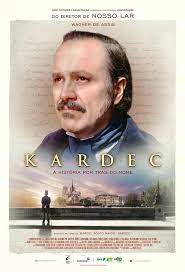
KARDEC
Brazil, 2019, 110 minutes, Colour.
Leonardo Medeiros, Sandra Corvelino, Christian Baltauss.
Directed by Wagner de Assis.
One hand, this is a period piece, friends in the 1850s, Paris. On the other hand, it is the portrait of a French educator who became the champion of spiritism. And, it is a Brazilian production, spoken in Portuguese – English language productions having no difficulties in presenting French dramas with characters speaking in English but unusual to have them speaking Portuguese!
There is great attention to period, costumes, decor, the buildings of the time (and computer expert and imitating modern buildings from the locations). Five days of production in France, the rest in Rio de Janeiro.
For audiences coming onto this film without preparation, may be taken aback at the portrait of Professor Ravail, a noted educationalist of the period, putting into practice theories of education writers, especially the rapport between teacher and student, illustrated in an opening sequence. But, then a priest arrives, demanding to teach Catholic catechism, ousting the Professor.
Ravail was something of a Renaissance man, involved in all kinds of scientific surprises, financial issues. However, as the unusual opening sequence indicates, hands on the circular table, rising into the air and spinning, interested in the phenomena of seances and spirits, and a dramatic experience for himself, contact with a spirit and a sense of destiny in philosophising about spiritism, exploring the existential and some theological implications in his writings.
Leonardo Medeiros is genial as the professor, becoming known as Allan Kardec, his nom de plume. He bonds very much with his supportive wife who, when he is finally arrested, takes on his cause.
There is continued criticism from those who do not believe in this Spiritism, from government officials interpreting his reflections and is subverting law and order, continued for Spiritism from the church.
There is a significant scene with a General, his sense of failure, despair, standing on a Paris bridge, Professor trying to persuade him not to jump but handling it all in a rather cerebral manner – and, the General jumping.
For those interested in Spiritism in the 19th century and its subsequent influence on a number of thinkers and writers, there will be much to appreciate. For those not interested, for those who are particularly critical and disbelieving, they may find it too much of propaganda.
So, it is something of a curiosity item.